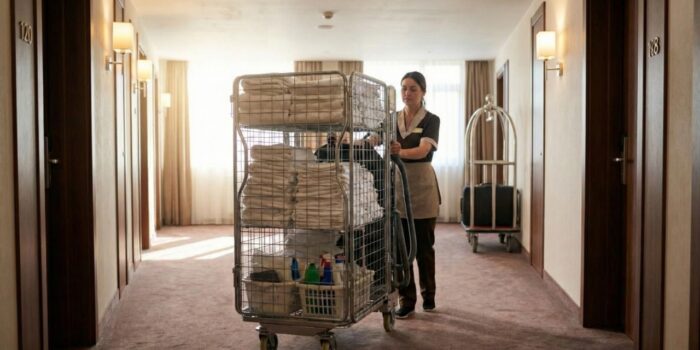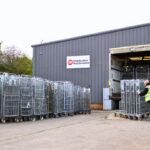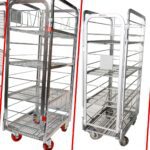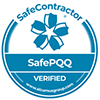Keep Them Rolling: Essential Maintenance Tips for Roll Cages
Roll cages are a vital lifeline for countless businesses, from warehouses to retail stores to distribution centres. However, like any piece of equipment, they require regular care and attention to ensure they work safely and efficiently. This guide will teach you maintenance tips for roll cages and help you keep your roll cages in top form, ensuring maximum return on your investment.
Regular Inspections: The Backbone of Good Maintenance
It’s impossible to fix what you don’t notice is broken. Make inspections a scheduled part of your routine – the frequency (weekly, monthly) will depend on how heavily the cages are used. Here’s your inspection checklist:
- Bent or damaged frames: Look carefully at joints, corners, and anywhere the metal tubing is under stress. Even minor dents can compromise a cage’s structure, making it more prone to failure under load.
- Loose or damaged castors (wheels): Check wheels for smooth swivelling and secure attachment to the cage base. Damaged or missing wheels make even small loads difficult to move, increasing the risk of both worker injury and product damage.
- Damaged or worn-out shelves (if applicable): Any bowing, cracking, or severe rust on shelves means they won’t support their rated capacity.
- Rust or corrosion: Pay attention to welded areas and points where the finish may have worn thin. Early intervention for rust is key to preventing larger-scale damage.
Cleaning and Sanitisation: More Than Appearances
Roll cages get dirty – it’s simply the nature of the job. But cleaning isn’t just about cosmetics, it also impacts:
- Workplace hygiene: Regular cleaning prevents dirt, grease, or debris from spreading through your facility.
- Professional image: Clean cages, whether visible to customers or not, reflect positively on your business.
- Public health (when applicable): For food, healthcare, or related industries, sanitisation is a non-negotiable safety requirement.
Knowing Your Limits: When to DIY Repairs and When to Call in the Pros
Some maintenance is easily handled by your own staff: replacing a basic castor, tightening loose bolts, etc. However, for more substantial issues, a specialist is your best option:
- Structural damage: Welding, major frame repairs, etc., require both specialist tools and the skill to ensure safety.
- Heavy rust or corrosion: If rust has gone beyond minor surface spots, it may require specialist removal and recoating.
- Uncertainty: When in doubt, a quick consultation with a repair expert is far less costly than a cage collapsing due to an unsafe DIY fix.
Store Smart: Protect Your Investment
Roll cages aren’t in use 24/7, but how you store them has a significant impact on their lifespan:
- Designated, dry storage areas: Left outdoors, cages are exposed to moisture, contributing to rust. Indoor storage is essential.
- Safe stacking procedures: Improper stacking can crush cages. Make sure staff know any stacking limits and how to stack securely.
- Protect floors (optional): If cages are moved constantly, consider floor mats or a protective coating in high-traffic areas to reduce wear on the base.
Prevention Pays Off: Reduce Damage Before it Starts
Simple practices go a long way in minimising roll cage wear and tear:
- Load distribution training: Staff should understand weight limits and how to distribute loads evenly within a cage.
- Careful handlers: Encourage a “go slow, be careful” approach to cage manoeuvring, reducing the risk of impact damage.
- Avoid harsh environments: Whenever possible, minimise cage exposure to moisture, extreme temperatures, or harsh chemicals that could speed up degradation.
A Worthwhile Investment in Efficiency
Properly maintained roll cages will:
- Reduce workplace accidents: Damaged cages are more likely to tip, collapse, or lead to handling injuries. Keeping them in good shape fosters a safer work environment.
- Minimise costly downtime: Broken cages needing repair are out of the loop. Having to replace them outright is even more expensive. Consistent maintenance keeps your operation running without unexpected interruptions.
- Enhance your professional image: Well-maintained roll cages, whether customer-facing or not, speak to a well-run business. Conversely, battered, rusty cages send a less than desirable message.
Additional Maintenance Considerations
Beyond the core principles outlined, here are some extra points to consider:
- Recordkeeping: For larger fleets, it’s useful to keep simple maintenance logs for individual cages. This helps track repair histories, spot recurring issues, and determine when a cage may be nearing the end of its useful life.
- Tailored to your environment: Industries with strict hygiene regulations (food, healthcare) will have additional maintenance protocols beyond standard cleaning/sanitisation.
- Environmental factors: Cages used outdoors need extra protection against the elements. Galvanised finishes or specialised coatings offer increased durability.
Partnering with a Refurbishment Specialist: Distribution Maintenance Keeps You Rolling
Even with excellent care, the time comes when roll cages need replacement, or you may acquire heavily used ones. Partnering with a reputable refurbishment company like Distribution Maintenance offers a cost-effective and sustainable solution. Our expertise restores cages to a near-new condition, extending their useable lifespan and saving you money compared to purchasing brand new replacements.
Why choose Distribution Maintenance for your refurbishment needs?
- Deep expertise: We’re not just familiar with roll cages, we specialise in them. This knowledge translates to high-quality restorations.
- Commitment to quality: Our process ensures cages are not only functional but also visually appealing, ready to represent your business well.
- Focus on customer service: We work with you to understand your specific needs, ensuring our refurbished cages exceed your expectations.
Key Takeaways
Roll cage maintenance doesn’t have to be complicated or overly time-consuming. By putting a few simple procedures in place, you can reap the benefits of:
- Longer-lasting equipment
- Smoother, safer operations
- Cost savings over time
- A more sustainable approach
Investing the effort to “Keep Your Roll Cages Rolling” is an investment in the efficiency and longevity of your entire business. Maximise the value of your roll cages and keep your operations running smoothly. Visit www.distributionmaintenance.com or call us at 01279 883 286 to discover how our maintenance and refurbishment solutions can benefit your business.









